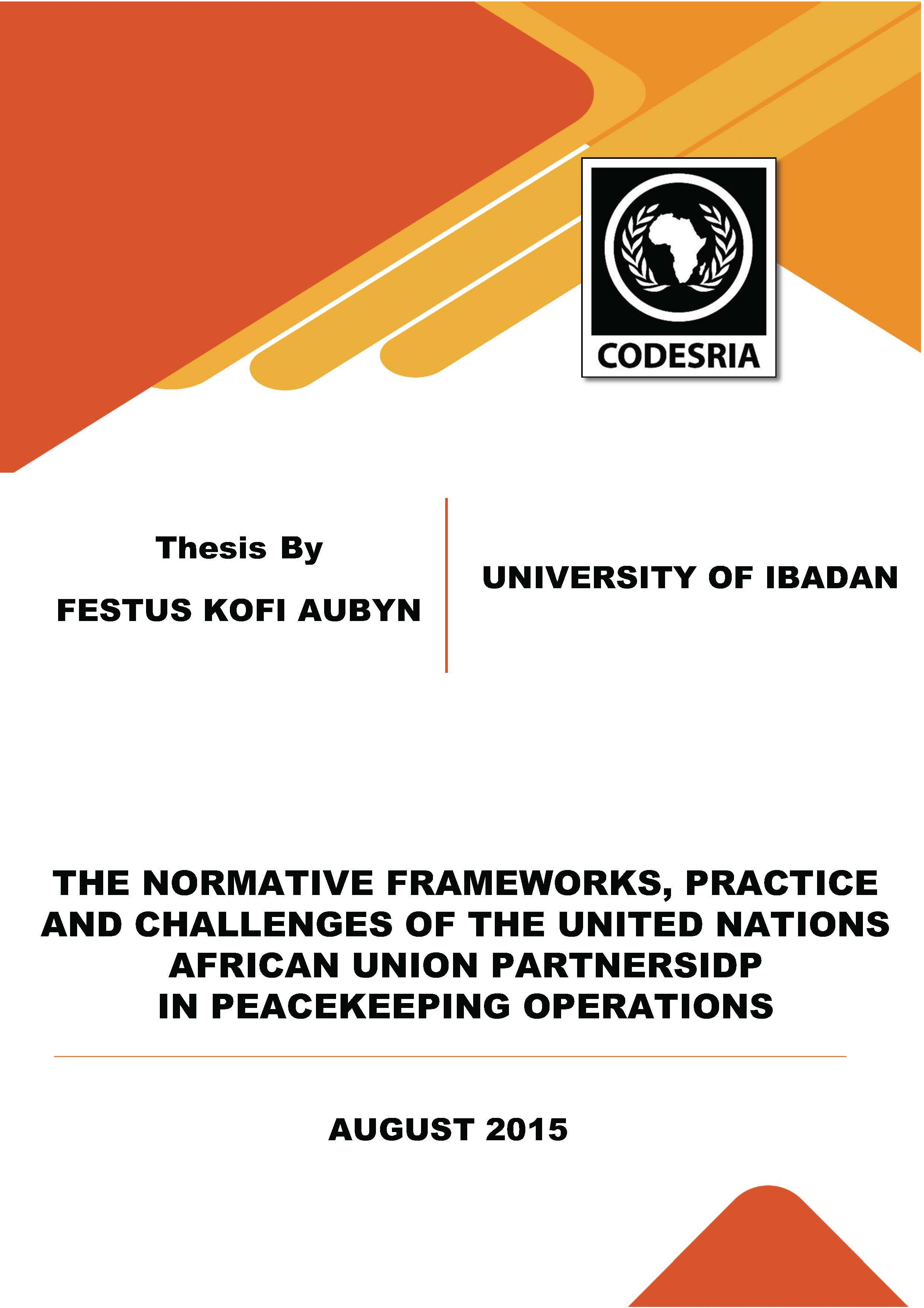The Normative Frameworks, Practice and Challenges of the United Nations/African Union Partnership in Peacekeeping Operations
Keywords:
Peace keeping, partnership, ECOWAS, case studies, African Union, Mali, Somalia, SudanSynopsis
The peacekeeping partnership between the Umted Nat10ns (UN) and the Afncan Umon (AU), which started in 2002, occurred at three levels strategic, institut10nal and operational The strategic partnership mvolves the UN Security Council (UNSC) and the AU Peace and Security Council (PSC), the 111stitut10nal partnership comprises the UN Secretanat and the AU Commiss10n, while JOmt peacekeepmg operat10ns have been earned out m Sudan, Samaha and Mah Existmg studies on how to improve the partneiship have focused on the operat10nal level to the detument of the other two This study, therefore, moved from the mmunahst view to a moie comprehensive appioach, by focusmg on the normative frameworks, practice and challenges of the partneiship The study adopted a qualitative app1oach and utilised a combmat10n of descnptive, explorative and case study research design Purposive samplmg techmque was used to select respondents who had knowledge of the pminersh1p The respondents included officials of the UN, AU, and sub-regional orgamsat10ns, military, police and civilian personnel, and academics A total of 3 9 in-depth mtei views were conducted m Eth10pia (12), Mah (13), Sudan (seven) and Ghana (seven) Fom focus g1oup discuss10ns were held with police personnel of vaned nationalities and peacekeepmg backgrounds Secondary data were sourced from UN m1d AU official documents especially the provis10ns of the Chapter VIII of the UN Chmter, the AU Constitutive Act and the AU PSC Pr0tocol Others consisted of books, Jomnal miicles and conference reports Data were subJected to descuptive content analyses The frameworks forming the basis of the partnership embody the general punciples, values, expectations and prescuptlve gmdelmes of responsibilities of both orgamsati0ns However, both inst1tuti0ns lack a shmed understanding of the interp1etat10n and apphcat10n of these frameworks, partly due to the unclem natme of roles The pmtne1sh1p has, in piactice, remained asymmetrical with the UN always takmg the dec1s1ons and responsibiht1es Apart from Somalia, all the Jomt operat10ns me cont101led by the UN, with the AU playmg ... roks While the partnership has resulted m pragmatic and flexible responses to conflicts m Sudan and Mah, and provided a way of sharing resources, 1t suffers from a variety of challenges Between the UNSC and PSC and theu respective secretanat, power differential has generated mutual suspecion, disagreement, compet1t10n, coordination and bureaucratic problems These have undermmed consensus and cohesi0n dunng JOmt perat10ns In Mah and Sudan, the two orgamsat10ns competed over the mission's cham of command, disagreed on the appomtment of semor officials, and took dec1s10ns without consulting each other Although the situat10n was d1ffe1ent m Samaha, both orgamsati0ns continue to have contradictory approaches regmdmg the 1esolut10n of the conflict A comprehensive approach to undeistanding the nature of the Umted Nat10ns/Afucan Umon peacekeepmg partnership revealed some fundamental challenges Future pminerships should be based on mutual trnst, comparative strengths, and a shared interpretati0n of the normative fI ameworks especially the Chapte1 VIII of the UN Chmier
Downloads
References
Abdallah, M O (2000) Burundi on the Brink A Special Envoy Reflects on Preventive Diplomacy Washmgton Umted States Institute for Peace
AdebaJo, A (2002) Buzlding peace in West Africa Liberia, Sierra Leone and Guinea Bissau Boulder Lynne Rienner
AdebaJo, A (2002) Liberia's Civil War ECOMOG and Regional Security in West Africa Boulder CO Lynne Rienner
AdebaJo, A (2004) From Congo to Congo UN Peacekeepmg m Afnca after the Cold War In I Taylor, & P Williams, (eds ), Africa in International Polztzcs Oxford & and New York Routledge
AdebaJo, A, & Scanlon, H (2006) A Dialogue of the Deaf Essays on Africa and United Nations Cape Town Jacana Media Ltd
AdebaJo, A (2011) UN Peacekeeping in Africa From Suez Crisis to the Sudan Conflicts Washmgton Lynne Rienner
Agwai, M L (2012) Reflections on the AU-UN Hybnd Model m Darfur In L Gelot, L Gelot, & C D Conmg (eds), Supporting African Peace Operations Uppsala The Nordic Afnca Institute
Akande, D, Plessis, M D, & Jalloh, C C (2010) An African expert study on the AU concerns about article 16 of the Rome Statute of the ICC Pretona Institute of Secunty Studies (ISS) Aldnch, H (1979) Organizations and environments Engle-Wood Chffs, NJ Prentice Hall
Anmg, K (1997) International Dimensions of Internal Conflict The Case of Liberia and West Africa Copenhagen Centre for Development Research
Anmg, K and Noagbesenu, H (2010) The UN and Afnca Options for Partnership and Support In C D Comng, A Stensland, & T Tardy (eds ), Beyond the New Horizon UN Peacekeeping Future Challenges Geneva Norwegian Institute of International Affa1rs and Geneva Centre for Secunty Pohcy
Anmg, K and Danso, K F (2010) An Afncan Perspective In N P1rozzi (ed ), Ensuring Peace and Security in Africa Implementing the New Africa-EU Partnership Rome Istituto Affan Intemazionah (IAI)






